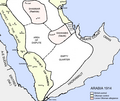The Saudi Arabia Portal – بوابة المملكة العربية السعودية
Saudi Arabia, officially the Kingdom of Saudi Arabia (KSA), is a country in West Asia and the Middle East. It covers the bulk of the Arabian Peninsula and has a land area of about 2150000 km2 (830000 sq mi), making it the fifth-largest country in Asia and the largest in the Middle East. It is bordered by the Red Sea to the west; Jordan, Iraq, and Kuwait to the north; the Persian Gulf, Qatar and the United Arab Emirates to the east; Oman to the southeast; and Yemen to the south. Bahrain is an island country off its east coast. The Gulf of Aqaba in the northwest separates Saudi Arabia from Egypt and Israel. Saudi Arabia is the only country with a coastline along both the Red Sea and the Persian Gulf, and most of its terrain consists of arid desert, lowland, steppe, and mountains. The capital and largest city is Riyadh; the kingdom also hosts Islam's two holiest cities of Mecca and Medina. (Full article...) Selected article -Women's rights in Saudi Arabia is a topic of concern and controversy internationally. Women in Saudi Arabia experience widespread discrimination in Saudi politics, economy and society. Saudi women have experienced some legal rights reforms since 2017, after facing Wahhabi religious fundamentalist dominance for decades. According to Human Rights Watch and Amnesty International, Saudi women experience discrimination in relation to marriage, family, and divorce, despite the reforms, and the Saudi government continues to target and repress women's rights activists and movements. Prominent feminist campaigns include the Women to Drive Movement and the anti male-guardianship campaign, which have resulted in significant advances in women's rights. (Full article...)Did you know (auto-generated)
NewsNo recent news Related portalsReligions in Saudi Arabia Arab states WikiProjectsThings you can do
This is a Good article, an article that meets a core set of high editorial standards.
 The Black Stone (Arabic: ٱلْحَجَرُ ٱلْأَسْوَد, al-Ḥajaru al-Aswad, 'Black Stone') is a rock set into the eastern corner of the Kaaba, the ancient building in the center of the Grand Mosque in Mecca, Saudi Arabia. It is revered by Muslims as an Islamic relic which, according to Muslim tradition, dates back to the time of Adam and Eve. The stone was venerated at the Kaaba in pre-Islamic pagan times. According to Islamic tradition, it was set intact into the Kaaba's wall by the Islamic prophet Muhammad in 605 CE, five years before his first revelation. Since then, it has been broken into fragments and is now cemented into a silver frame in the side of the Kaaba. Its physical appearance is that of a fragmented dark rock, polished smooth by the hands of pilgrims. Islamic tradition holds that it fell from heaven as a guide for Adam and Eve to build an altar. It has often been described as a meteorite. (Full article...)Selected pictureMore did you know
General imagesThe following are images from various Saudi Arabia-related articles on Wikipedia.
Featured contentFeatured articlesGood articles
Associated WikimediaThe following Wikimedia Foundation sister projects provide more on this subject:
Sources
Discover Wikipedia using portals | ||||







![Image 3A view of Jabal Sawda, a peak located in Saudi Arabia, with an elevation of around 3,000 metres (9,843 ft).[1]](http://upload.wikimedia.org/wikipedia/commons/thumb/5/59/Al_Sawda_peak.jpg/120px-Al_Sawda_peak.jpg)




















































